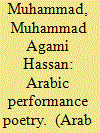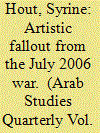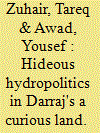|
|
|
Sort Order |
|
|
|
Items / Page
|
|
|
|
|
|
|
| Srl | Item |
| 1 |
ID:
153221


|
|
|
|
|
| Summary/Abstract |
Performance poetry, as a literary term, is known in the Western literature, although some critics may not consider it literary in the first place. This article assumes the applicability of this term to new attempts of some Egyptian youth whose poems share the common features of performance poetry in English literature. Their poetic works are passionate, rhythmic, using aural and visual effects in the background, and dialects in addition to the poet's presentation of the poem face to face with the audience. Regarding the content, their verse has preceded and accompanied the political turmoil Egypt witnessed before, during, and after 25 January Revolution. For this reason, this poetic pattern loudly reflects the concerns, demands, and aspirations of the rebellious generation of youth and the whole Egyptian society. It can be considered the manifestation of the new challenging spirit of the youth in Egypt. The aim of the research is to highlight the similarities between the Anglo-American performance poetry and the literary works of two Egyptian young poets: Hisham al-Gakh and Amr Qatamish. As an interdisciplinary study, literary criticism, cultural criticism including socio-political analysis will be utilized to elucidate how performance poetry represents a new trend of resisting corruption and injustice, as well as a revolution against conventional poetic forms.
|
|
|
|
|
|
|
|
|
|
|
|
|
|
|
|
| 2 |
ID:
153219


|
|
|
|
|
| Summary/Abstract |
A decade after the end of Israel's 2006 war on Lebanon, I spotlight the hitherto under-researched literary portrayals of the conflict. Following an overview of the immediate and (then-) innovative media tools and techniques used to capture its momentum—blogging, video-making, and online comics—and of Arabic-, French-, and English-language literary writings referring to the war, I focus on how literature, which requires time for its “contents” to be distilled into a form removed from emotional immediacy, succeed not only in reflecting it but also in reflecting on it through various fictional(izing) prisms. I do so by comparing the methodologies adopted by Nada Awar Jarrar's A Good Land and Abbas El-Zein's Leave to Remain: A Memoir, both published in 2009, and by arguing that they share a sense of guilt and hence exhibit an ethical exigency by incorporating particular discourses to mediate and mediatize this war as crisis: the social/humanitarian in A Good Land and the visual/photographic in Leave to Remain.
|
|
|
|
|
|
|
|
|
|
|
|
|
|
|
|
| 3 |
ID:
153222


|
|
|
|
|
| Summary/Abstract |
Water is a contextual symbol in literature. It stands for many things, depending on how it is used in a literary work. It represents, among other meanings, cleanliness, life, salvation, purification, and redemption. In Susan Muddai Darraj's A Curious Land, water plays a pivotal role in conveying themes and ideas that are pertinent to the Palestinian-Israeli conflict. In particular, this article explores how Darraj draws on the multivalent connotations of water to aesthetically and thematically valorize some of the dynamics of the Palestinian-Israeli conflict. In a way, water intricately intertwines with the national Palestinian identity and it explains the causes of several Israeli assaults and aggressions on Palestinian territories and neighboring Arab countries. As the collection shows, Israeli hydropolitics and hydro-apartheid keep the Palestinians below the water poverty line in a bid to destroy their resilience and force them to emigrate. Hence, water in this collection acquires important meanings for the Palestinians, like rejuvenation, resistance, and rootedness.
|
|
|
|
|
|
|
|
|
|
|
|
|
|
|
|
|
|
|
|
|